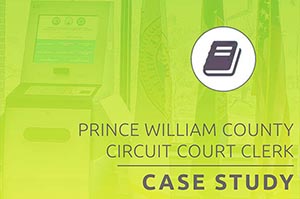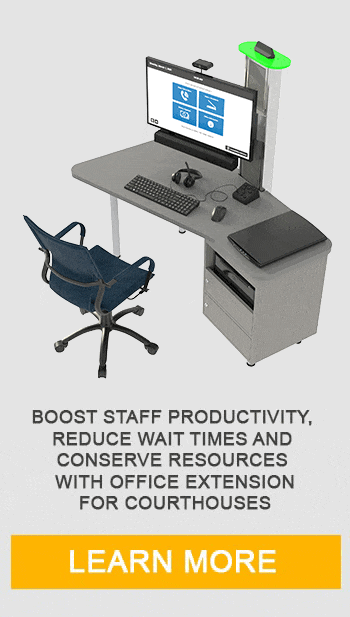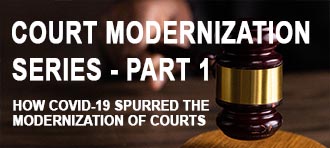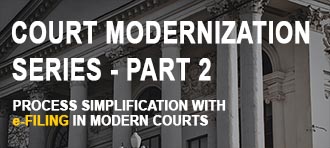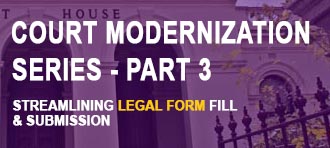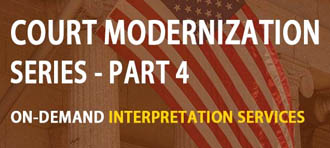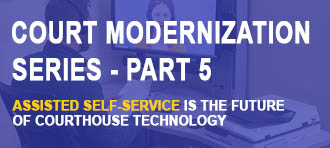The Covid-19 pandemic has changed the way businesses and organizations conduct daily operations, and courthouses and other government organizations are no exception.
For residents, one of the pain points of courthouse services is the inconvenience of taking time off work to utilize these services during limited business hours. Not only is this inconvenient for members of the community, but it depletes the already limited resources many courthouses and government organizations have to work with.
With self-service kiosks, residents can conduct government business on their time. Government employees have increased flexibility to focus on other tasks with the automation of essential court services.
How Can Courthouse Services be Automated with Self-Service Kiosks?

- Marriage licensing
- Permits
- Payment of government fines and fees
- Document printing and scanner
- Notary oath
- And more
The customer-facing software used for courthouse services provides additional features like scanning, printing, form fill, and more. Moreover, the needs of courthouses may differ depending on the needs of residents. That’s why courthouses can choose what services they want to provide on the ADA compliant kiosk.
How Can Kiosks Help Members of Your Community?
We’ve all been there – forced to take time off work to perform essential courthouse business during what is typically limited business hours, Monday through Friday.
With self-service kiosks, this significant pain point is a thing of the past. By automating services like marriage licenses, gun permits, the notary oath, payments, and more, courthouses provide members of the community with the flexibility to perform their legal rights at a time most convenient for them, without sacrificing a paycheck. With kiosks, customers can apply for a marriage license at 7 pm on a Thursday or 9 am on a Sunday.
Additionally, automating these services provides courthouse employees with increased flexibility and more time to focus on other tasks, all while encouraging social distancing during the Covid-19 pandemic.

Prince William County in Virginia is centrally located for its 470,000 residents. Still, this requires taking an entire day off work and sitting on a bus for 3 hours to perform essential government business for thousands of citizens. This led to stress for residents who could not conveniently access the court during its business hours of 8 am – 4 pm and exhaustion for overworked courthouse employees.
Court clerks recognized that something needed to change to accommodate all its residents. The result? Self-service kiosks.
With the self-service documentation kiosk, residents can access essential court services outside of court office hours at times convenient for them. Once fully rolled out, the six self-service kiosks will be available 24 hours a day, seven days a week, and accessible in both the courts and the local public library.
Read the entire case study here.
Learn More About Self-Service Kiosk Solutions for Courthouses
Advanced Kiosks is a complete solution provider, experienced in kiosk manufacture and kiosk software design and development.
Based out of Concord, New Hampshire, Advanced Kiosks has been in the kiosk industry for nearly 20 years and is experienced in developing the perfect full-package solution for any business. Please explore our website at www.AdvancedKiosks.com to learn how self-service kiosks can enhance your courthouse or government agency, and reach out to one of our kiosk professionals to get started on your kiosk project.
Overall, residents’ response in Prince William County has been positive, with one of the most notable pieces of feedback coming from within the court itself.
“The most notable feedback is the chief judge and clerk of one of the lower courts came upstairs to look at the kiosks and said, ‘we need these.’ Smith said. I have been in this position for three years, and the chief judge has never come up here previously. People are talking!”
In the short-term, the kiosks have satisfied the immediate needs of its residents. In the long-term, the expectation is to expand the availability of the kiosks to meet demand.
“Long-term, the kiosks are going to allow everyone in the population to exercise their fundamental rights, and right now, we can’t necessarily say that people can do that, said Smith. I don’t think there’s any greater thing that any piece of technology could do for us right now than to allow people to access those systems without any burden.”
To learn more about interactive self-service kiosks and schedule a call with one of our project managers, visit www.AdvancedKiosks.com or call 603-865-1000.



